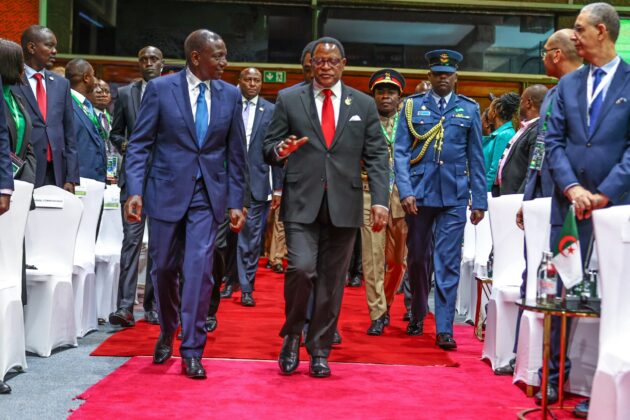
President Ruto roots for adoption of strategies that make fertiliser affordable » Capital News
NAIROBI, Kenya, May 9 – President William Ruto has urged African leaders to adopt strategies that make fertiliser affordable and accessible to farmers.
The President emphasised the need for collaboration among African countries to boost the continent’s capacity to produce fertiliser using locally available raw materials.
He pointed out that fertiliser self-reliance is essential to ensure that Africa has timely, adequate and appropriate fertiliser available during the planting seasons.
President Ruto explained that this would unlock Africa’s agricultural productivity, thereby spurring economic growth, expanding job opportunities and enhancing food security.
“Unlocking this potential not only gives us an opportunity to feed our people and this continent, but also an opportunity to engage in agro-processing, value addition and manufacturing with agro-based raw materials,” he said.
The President spoke during the Fertiliser and Soil Health Summit at the Kenyatta International Convention Centre in Nairobi.
Present were Presidents Emmerson Mnangagwa (Zimbabwe), Lazarus Chakwera (Malawi), Hakainde Hichilema (Zambia), Nangolo Mbumba (Namibia) and Faustin-Archange Touadera (Central African Republic).
Others were Eswatini Prime Minister Russell Dlamini and African Union Commission Chairperson Moussa Faki Mahamat.
President Ruto said it was risky for the continent to continue relying on fertiliser imports, noting that Africa has what it takes to produce organic fertiliser.
He pointed out that recent global economic crises, along with supply chain disruptions during the COVID-19 and geopolitical dynamics, have made fertiliser affordability and availability an issue of concern.
These challenges, the President said, have disrupted agriculture in several parts of the continent, leading to reduced acreage and lower yields.
“Fluctuating fertiliser prices and supply chain
disruptions, exacerbated by conflict in producing regions, demand deep reflection on ways of securing adequate, affordable, and sustainable fertiliser production and supply across Africa,” he said.
While some African countries have made strides in phosphate fertiliser production, he noted, the continent still has a long journey ahead in nitrogen fertiliser production.
On the huge impact fertiliser makes in agricultural output, the President cited Kenya as an exemplary example of how a country can use the input to enhance productivity.
President Ruto said the use of crop-specific fertiliser and technology to improve the distribution process resulted in bumper harvests.
“If anyone had doubt that proper application of fertiliser gives results, Kenya’s case is a clear testimony,” he said.
He also urged African States to take advantage of the African Continental Free Trade Area Agreement to boost intra-continental trade, particularly in agricultural products and increase farmers’ incomes across the continent.
The President said Pan-African integration will provide a basis to harness research, science and technology to develop a robust African Soil Information System.
He noted that this initiative will foster a community of soil health experts in diverse sectors, bolster research efforts and improve soil testing capacity to facilitate informed decision-making.
Mr Faki said the African Union Commission is dedicated to addressing soil health issues in African countries to enhance the continent’s productivity.
He emphasised the need to build Africa’s capacity to produce fertiliser locally, noting that importation has made the input costly.
“We need to renew political will by Member States through the mobilisation of domestic resources to reflect the priorities of the agricultural sector,” he said
His sentiments were echoed by President Mnagangwa, who said Africa must use its raw materials to produce sufficient fertiliser locally.
“Greater efforts must be made to leverage on the availability of raw materials for the local production of mineral fertilisers and reduce our over-reliance on imports,” he said.
President Hichilema said while the continent strives for fertiliser availability, it must also ensure affordability so that farmers can easily access it.
The Zambian President called on African Union member States to enhance their capacity to produce fertiliser locally, pointing out they must commit to buying fertiliser from within the continent.
He warned that it would be counterproductive if African countries invested in fertiliser production while continuing to buy it from outside the continent.
President Mbumba said the rising global population presents Africa with an opportunity to increase food production, adding that this will require more agricultural inputs, including fertiliser.
